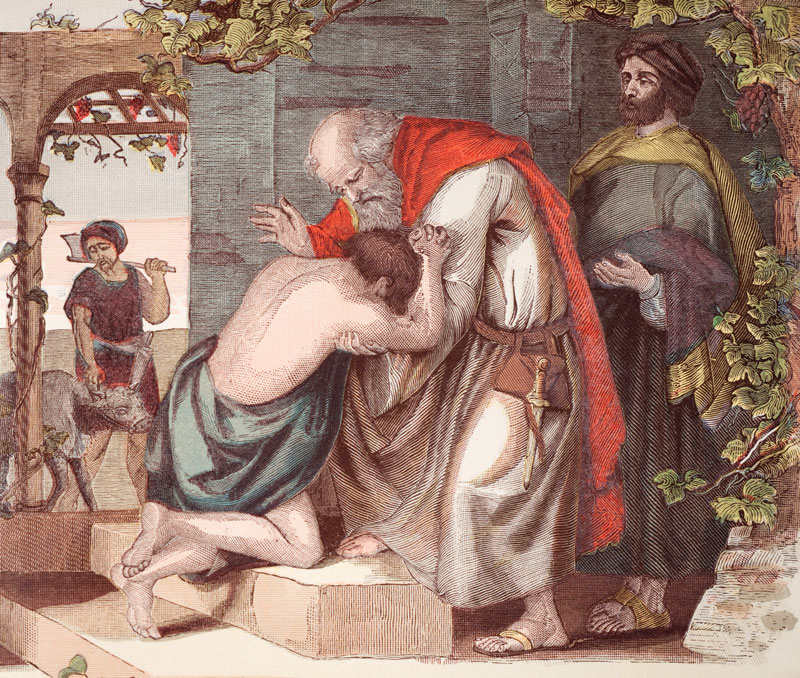After the reunion of the prodigal and his father, the bestowal of gifts and the party to celebrate the return of the younger son, Jesus lifts the curtain on another dynamic in this household. The focus of the story has been on the father and the younger son, but what about the older brother? He was introduced in passing at the beginning of the story, perhaps as a prop. We had forgotten about him. In fact, he almost seems to have been forgotten within his father’s household.
While the party celebrating the return of the prodigal was underway, the elder son was working in his father’s field. When he learned that his younger—irresponsible and wayward—brother had returned and had been embraced by their father, the elder brother’s anger surged. When confronted by his father, the elder son protested that he has worked hard—like a slave rather than a son (see Luke 15:29)—to please his father, only to have a party thrown for his brother, who had shown no loyalty, faithfulness or concern for his family, and who had returned empty-handed. “Why does he deserve this kind of treatment? Why have you never celebrated my presence with you? My faithfulness? My hard work?” he asks.
 The response of the father is telling. First, the father affirms his elder son’s work and place in the family. Everything that the father has will be given to his elder son. The reception given to the returning son has not diminished what will be given to this elder son. But second, despite the prodigal’s irresponsible departure, riotous living and squandering of his share of the family inheritance, the fact that he has come home must be celebrated. For the father who thought his son was lost forever, the return of the prodigal brings immense joy. The lost has been found; the wanderer has come home! Who could resist rejoicing?
The response of the father is telling. First, the father affirms his elder son’s work and place in the family. Everything that the father has will be given to his elder son. The reception given to the returning son has not diminished what will be given to this elder son. But second, despite the prodigal’s irresponsible departure, riotous living and squandering of his share of the family inheritance, the fact that he has come home must be celebrated. For the father who thought his son was lost forever, the return of the prodigal brings immense joy. The lost has been found; the wanderer has come home! Who could resist rejoicing?
As I read this final scene in the parable, three thoughts come to mind. First, the elder son gives away his innermost feeling when he notes that he has worked like a slave (see Luke 15:29). He was a son, but he worked liked a slave. I think his comment was not about the intensity of his labour, but rather revealed that his hard work was offered out of obligation more than love. He may well have started out working “as a son,” but that enthusiasm melted away over time. In the crush of daily labour, the elder son had replaced his joyful service as a son with the grudging obligation of a slave. He had worked for “hireling wages.”
Second, the elder son assumes that grace is a limited commodity, with only so much to go around. That is, whatever the father gives freely to the younger son will diminish what is available to the faithful son. Once this perspective has been adopted, it is easy to slide into the belief that, from the perspective of the elder son, there is something inherently unfair about the father’s gracious reception of the prodigal. He didn’t deserve to be celebrated! He didn’t deserve to be welcomed home in this way! He didn’t deserve to receive a cloak, a ring and a fatted calf! The elder son is correct on all three points. But what this parable teaches is that grace is not about what we deserve. Grace is not a limited resource with only enough available so that everyone gets a small share. God’s grace is abundant, even overflowing. It is about what God is prepared to give, much more than what we deserve.
The hardest lesson to learn about grace seems to be that God’s generosity toward others does not cheat me out of my inheritance. When God extends grace to someone else, it doesn’t come out of my account. There is plenty to go around. The grace of God our Father knows no limits as he waits for the lost child to return and as he acknowledges the labour of those who have been faithful over the long haul.
Finally, the parable of the Prodigal Son teaches that the grace of God is embarrassingly unfair. God showers it upon those who are most undeserving. God is generous beyond measure—perhaps even beyond reason—when it comes to God’s lost children. For those of us who have been on the journey of faith for a long time and who have given faithful service, perhaps God’s lavish grace toward those who have not worked alongside us or who have not shared in the hard labour of faithfulness is offensive. Too often, we think that grace should be distributed “fairly.” But Jesus taught that God’s grace overflows every channel we construct to contain it—beyond what we deserve, beyond what is reasonable. Perhaps most offensively, God’s grace flows over those whom we think deserve it least! The calculus of grace doesn’t work according to our rules, but rather according to the expansive love of God for those who are lost.
The unfairness of God’s grace must have been a serious issue among Jesus’ earliest followers. Jesus teaches a similar lesson in the parable of the workers in the vineyard (see Matthew 20:1-16). There, workers hired early in the day object to receiving the same pay as those who start work near the end of the day. It’s just so blatantly unfair. I get that. Yet as this story concludes, the grace of God is God’s to give, not ours to calculate and hoard. Despite all of our efforts to regulate and control who can receive God’s grace and under what conditions they may receive it, grace overflows. After all, if the parable of the Prodigal Son teaches us anything, it is that there is a wideness in God’s grace beyond anything we imagine.
Dr. Donald E. Burke is a professor of biblical studies at Booth University College in Winnipeg.
This is the third in a series of three articles on the parable of the Prodigal Son. Read the first article: Lost and Found. Read the second article: Extravagant Love.
Illustration: ConradFries/iStock.com via Getty Images










Leave a Comment